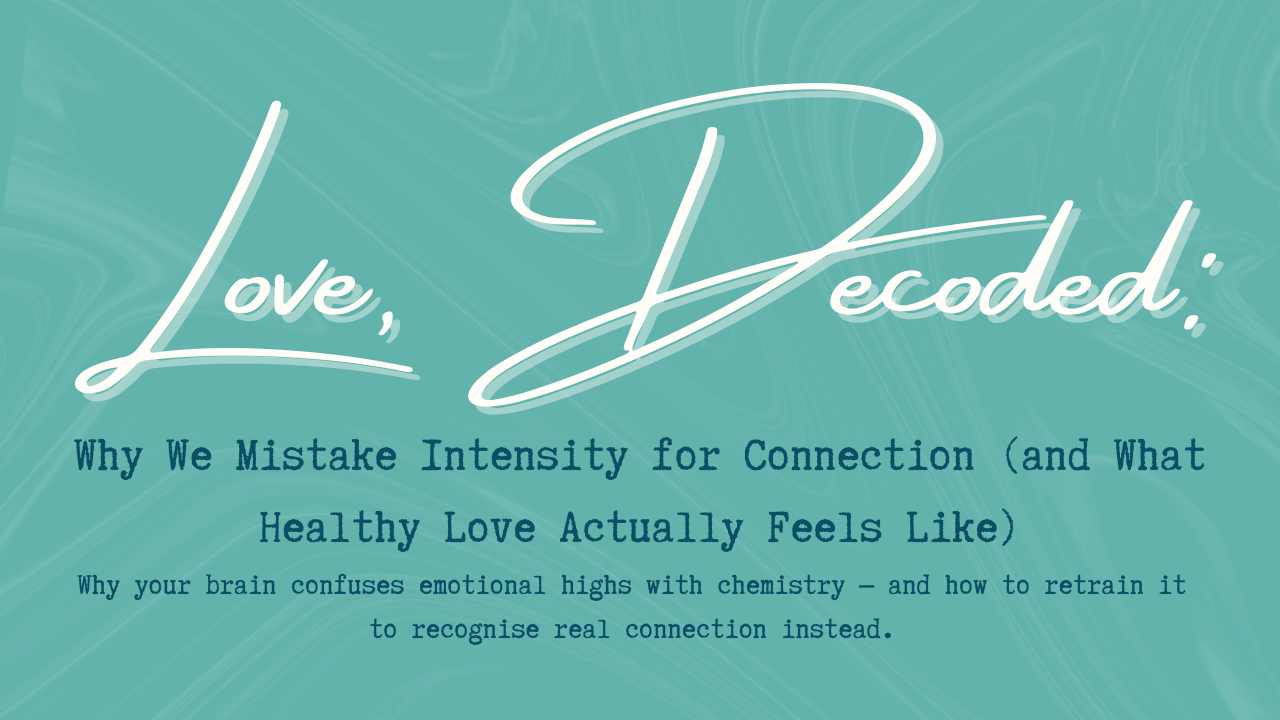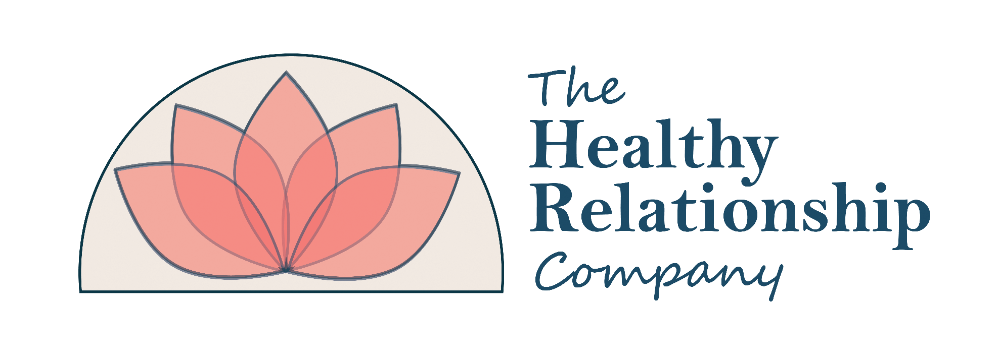
Why We Mistake Intensity for Connection (and What Healthy Love Actually Feels Like)
Nov 03, 2025Here's why your brain confuses emotional highs with chemistry - and how to retrain it to recognise real connection instead.
We mistake intensity for connection because our brains equate emotional adrenaline - the rush of excitement, the quick heartbeat, the uncertainty - with love and chemistry.
But intensity is about activation.
Connection is about safety.
And for many of us, especially after unhealthy or inconsistent relationships, that difference can feel confusing as hell.
💬 The Story: “It just felt electric…”
Meet Amber.
She’s the friend who dives in fast.
When she meets someone, it’s instant sparks - late-night messages, butterflies, can’t-eat, can’t-sleep energy.
It’s intoxicating. She calls it chemistry.
But a few weeks in, that chemistry starts to sting.
The constant highs turn into lows. The texting slows. She overthinks every pause in the conversation, feeling that familiar anxiety creep in.
By month three, she’s exhausted - confused how something that felt so powerful could vanish so fast.
Sound familiar?
Amber’s not addicted to drama.
Her brain is chasing familiarity.
🧠 What “Intensity” Really Means
When we say intensity, we’re talking about emotional activation.
It’s the surge of adrenaline, dopamine, and cortisol that floods your body when something feels unpredictable or high stakes.
It’s:
-
Obsessively checking your phone for a reply
-
Feeling euphoric after a tiny bit of affection
-
Losing your appetite because your mind is spinning
-
Feeling desperate for closeness but terrified of being too much
That chemical cocktail creates a rush - and when someone gives you intermittent attention or affection, your brain pairs that rush with the idea of love.
This is the Intermittent Reinforcement Cycle in action: the same psychological mechanism that makes slot machines addictive.
Your brain keeps chasing that next “hit” of validation - not because it’s enjoyable, but because the uncertainty keeps the reward powerful.
💞 What “Connection” Actually Is
Connection is the opposite of that.
It’s not about spikes and crashes - it’s about stability and reciprocity.
Connection looks like:
-
Feeling calm in someone’s presence
-
Knowing where you stand
-
Being able to talk about hard things without fearing abandonment
-
A sense of curiosity rather than panic when you’re apart
In your body, it feels grounded.
Your breathing slows. Your muscles soften. Your nervous system feels at rest, not on alert.
It’s not a rollercoaster - it’s a rhythm.
⚖️ Why We Confuse the Two
Here’s where psychology and biology collide.
If you grew up around inconsistent love - where affection was unpredictable or approval had to be earned - your nervous system learned that intensity = connection.
The unpredictability felt familiar, and your brain labelled familiarity as safe.
So when someone calm, kind, and emotionally available shows up, it can feel… flat.
That’s not because they’re boring.
It’s because your nervous system doesn’t yet recognise safety as love.
In fact, early in healing, peace can feel unsettling.
You might find yourself thinking:
“There’s no spark.”
“Something’s missing.”
“They’re nice, but I’m just not feeling it.”
Often, what’s actually “missing” is anxiety.
🧩 The Science Bit
When you experience intensity, your sympathetic nervous system - the part responsible for fight, flight, or freeze - activates. It floods your body with cortisol and adrenaline.
That chemical surge can feel alive, magnetic, even destined.
But what could actually signalling is threat mixed with a sprinkling of desire - the same biological response that happens when you’re walking a cliff edge or waiting for a text that could change everything.
Connection, meanwhile, lives in your parasympathetic nervous system - the calm, grounded state of safety and trust.
It doesn’t need constant reassurance because it already feels secure.
It’s not a spark - it’s a steady flame.
🌱 The Turning Point
For Amber, the breakthrough came during therapy when she said,
“I miss the butterflies.”
Her therapist smiled and replied,
“The butterflies were anxiety.”
That sentence changed everything. Excitement and anxiety can feel exactly the same. Bingo!
Amber started paying attention to her body instead of her brain.
When she felt the familiar high, she paused:
“Is this excitement… or is this fear being confused with passion?”
She began to learn the difference.
And for the first time, calm started to feel like connection.
💫 How to Rewire What “Love” Feels Like
1. Redefine Chemistry
Start seeing chemistry not as a rush, but as ease.
It’s the person who makes your shoulders drop - not the one who makes your stomach knot.
2. Notice What Your Body Does
Does your chest tighten? Do you feel the need to prove yourself?
That’s intensity.
Do you feel relaxed, seen, and at peace?
That’s connection.
3. Practise “Safe Boring.”
Spend time with people who make you feel safe, even if it feels dull at first.
Your nervous system needs repetition to learn that peace isn’t danger - it’s home.
4. Don’t Look For Closure In The Mayhem.
If you feel pulled to re-enter a cycle just to “get answers,” pause.
What you’re craving is regulation - not resolution.
5. Ground Yourself Before You Swipe.
When dating, take three deep breaths before making decisions.
Choose from calm, not from adrenaline.
🌤 The Transformation
Real love doesn’t need to set you on fire to keep you warm.
When you heal the link between intensity and attachment, you stop craving chaos as proof of passion.
You start recognising that genuine connection is built, not chased.
And slowly, your nervous system learns a new story:
Love isn’t supposed to feel like anxiety.
It’s supposed to feel like calm.... Aaaah.
💌 Your Next Step
If your relationships have always felt intense but never secure, it’s time to understand why.
Take the Clarity Check-In Quiz to discover where you are in your relationship recovery - and learn how to build the kind of connection that actually lasts.
Stay in the loop!
Get psychology-backed relationship tips straight to your inbox.
We hate spam. We will never sell your information, for any reason. By subscribing to The Clarity Drop Newsletter, you also agree to receive occasional updates and marketing. We will only send things that would be genuinely useful to you. Unsubscribe at any time.
